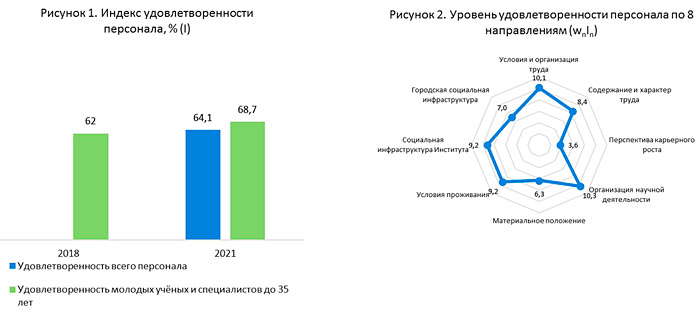
Electronic english version since 2022 |
The newspaper was founded in November 1957
| |
About the results of the survey of JINR staff
In December last year, a survey on the social satisfaction of the JINR staff was conducted. A few years ago, a similar survey was conducted among the members of AYSS, this time all the staff members of the Institute were welcome to participate. In April, a meeting of the Council for Social and Infrastructure Projects for the Development of JINR was held, at which the author of the survey, Senior Lecturer of the Department of Sociology and Humanities of the Dubna State University Tatyana V.Balueva, presented the results of the sociological survey.
524 respondents took part in the survey, among them 69 citizens of other states. VBLHEP led in terms of active participation - the staff of this laboratory accounted for 29% of the respondents, DLNP (19%), FLNP (14%), etc. In terms of categories of employees, the most active staff members were researchers and specialists (39 and 38%, respectively), 12% - workers and 10% - managers. Men made up 69% and the most active age category was 26-35 years old.
In general, the level of social satisfaction of the JINR staff can be characterised as average: the overall index, calculated as the shares of "rather" and "fully satisfied" respondents, equaled 64.1%. Tatyana Balueva noted that this was a very good indicator, especially as compared to other organisations for which such surveys were conducted. In addition, respondents pointed out that in recent years there had been an improvement in many of the fields considered.
In 2018, a similar survey of young scientists was conducted. A positive trend has been identified for most of the comparable indicators. Thus, the shares of rather and quite satisfied respondents with the current housing has increased from 58% to 65.5%. Over the past year, 40% of respondents under 35 affirmed an improvement in their financial situation. The decrease is observed mainly in terms of indicators of satisfaction with the organisation and working conditions, with the exception of the system of material incentives.
In general, the indicator of satisfaction with the financial situation at the Institute was less than 50%. There is a significant gap between real and desired income for most categories of employees. The housing issue remains the topic issue, especially for young scientists and specialists: 56% of all respondents and 70% of respondents under the age of 35 say that they need to improve their living conditions.

Satisfaction index: I=![]() wnIn
wnIn
wn is the evaluation of the satisfaction indicator, determined in accordance with the importance of this indicator for respondents; In is the average value of satisfaction for a specific indicator, defined as the average value of the share of satisfied respondents across the indicators used to measure the indicator.
The survey also revealed problems in the field of information. Employees reported that they often learnt information about any special financial and non-material support programs by chance, through third parties, or even from the survey itself. Such measures include subsidized prices for trips and membership cards to sports complexes, additional health insurance, free housing or partial payment of rent, interest-free loans, subsidized meals, skills enhancement, transportation of employees to work, payment of transportation costs. 4% of respondents answered that they did not know about these non-material support measures at all, 80% did not know about subsidized prices for trips, etc.
A number of shortcomings are recorded in the field of social infrastructure.
However, for a large list of estimated statistical parameters that affect the degree of satisfaction with work at JINR, high values have been recorded. More than half (55%) of the respondents appreciate the work at JINR as undoubtedly prestigious. On average, every second employee of the Institute considers the work he is engaged in interesting, important, significant, promising, complex and creative. 72% of respondents are satisfied with the opportunities provided by the Institute for self-realization and self-development.
The majority of respondents (86.5%) evaluate the relations that have developed in their work collective as good or rather good. Just above 41% of respondents note that there is a high level of cooperation and mutual assistance in their workforce. Only 2.3% of respondents believe that relations between colleagues in their work team are bad or rather bad. The low level of cooperation, in which "each to his own", is noted by 7% of respondents.
Despite all the shortcomings that occur at the Institute, 66% would choose to work at JINR again, 40% would not like to work in another organisation.
The survey questionnaire was not simple, one had to answer a lot of questions. However, the data obtained allowed to study the opinion of employees on such aspects as the conditions and content of work, the social climate in the team, relationships with heads, career prospects, organisation of scientific activities, financial situation, non-material support, housing issue, urban infrastructure, social infrastructure of JINR, improvement of laboratory sites. In addition, this survey allowed to collect a lot of suggestions and wishes. The full version of the report is published on the JINR website, and in fact it is not only statistical summaries for analytics, but also a collection of ideas to make work at the Institute more comfortable. Some of them, at first sight, seem fantastic. However, many respondents compare JINR with other international research centers, where such a service has long been a common practice.
The participants of the meeting listened with great interest to the presentation of the survey, noted the high professionalism of the sociologist and expressed their interest in such a survey to become regular, if possible, annual. The organisers of the survey hope that in the future a larger number of JINR employees will participate in sociological surveys, because this is one of the ways to convey their point of view to the Directorate of the Institute.
Material was prepared by
Olga KRUPA, Galina MYALKOVSKAYA